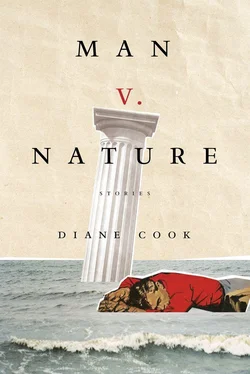“What’s it feel like?” I ask, because even though she has stopped liking me, she’s the only person who can tell me.
Marni rolls her eyes. I want to slap her hard, but I have no one else to ask. Does it feel slick like glue? Is it a pressure like shoving? I picture my dad’s girl calendar, tacked on the stainless steel fridge. I can’t ask him. I can’t ask my mom. I can’t ask Clara because I hate her, and what would she know?
Marni bites her lip thoughtfully, and I almost think she’s going to tell me, but then her face scrunches like she’s going to cry, just for a second. “Just do it,” she orders and punches my shin.
I drop my knee with what feels like my whole weight behind. It sinks into her like I’m landing on Mom’s too-soft bed.
“Ooph,” she bellows.
“Shh. You’re being too loud,” I whisper. “Why can’t you just go to the doctor?”
The way she looks at me, I can’t figure out if there is something about the world I don’t know yet, or the other way around. There’s something about the world that isn’t real to her yet, either, like doctors, or problems with simple solutions. The world is where things feel too hard to explain, and so they stay a secret.
I drop my knee again.
“Oh, oh,” she moans, and I worry Mom will hear.
“Shut up,” I snap. I feel the sharp shame of being in trouble even though no one knows. It was always this way with Marni — thrills and pains. I always felt good and bad because of her. I shove her hard with my foot. “You’re trouble.”
She gasps, and then really sobs. “You’re so mean.”
“I’m mean?”
“You’re the meanest!”
I didn’t think I was mean. I thought Marni was mean. Were we mean together? And if we used to be mean together, why couldn’t we still be? I want to be meanest with her.
I find a pair of balled-up socks on the floor and push them into Marni’s mouth. She makes protest sounds and starts to take them out, but I push them in farther until she gags. She quiets down and watches me with big, alert eyes.
I prod my toe into the fattest part, just below her belly button. I step there lightly with my bare foot; steady myself with the bedpost. I place the other foot. It’s like being in an inflatable castle at a street fair; everywhere I step gives way, and it’s hard to get my balance. My foot slips, rakes her side. She winces. I finally get on good, hand on the bedpost, other arm outstretched. Balanced. Her belly squishes under my feet, but beneath all that fat is a small, hard mound that seems to push up against my weight in self-defense.
I begin to bounce up and down, lightly, and Marni huffs quietly into those socks, to the rhythm I make. With each bounce, I gain momentum like I’m on a trampoline, and so I bounce a little harder, faster. I’m no longer slipping. Marni’s huffs get louder and I dig my heels in as a warning. She squeals unhappily through the socks, and after that, the only noise she makes is a tiny gurgle in her throat like she’s going to vomit.
It’s like the fat has melted away, and all I can really feel now is that secret mound. I want to break it open, slay the dragon, save the princess. I don’t want to stop until I’m sure it has worked.
Tears flow from Marni’s eyes; they run through her hair, pool in her ears, spread darkly on the pillowcase. Her balled fists unclench, and she covers her face.
I can’t explain it, but I feel maybe the best I’ve felt since the end of last year, when on the last day of school me and Marni and a couple other girls snuck into movies all day without getting caught. We’d heard it could be done from someone’s older sister. We’d leave before the end of one movie, run into the bathroom, and hide in stalls to wait for the next one; me and Marni squatting in the same stall, feet on the toilet seat, leaning against the walls, laughing into our hands at the fact that we were doing the things other kids did. We were becoming like other kids. And it was so easy. Just a series of steps.
It had been days since Phil and his two oldest friends drunkenly fished from the middle of the great lake for fat trout, the sweet orange flesh of which tasted best grilled over charcoal, under stars tossed absurdly across the sky like birdseed.
Days since Phil’s boat ran out of gas, stranding him and his friends during this, their annual fishing trip.
Days since Phil had seen another boat or passing tanker, which was strange on a lake usually choked by commercial traffic and sport boats.
Days since they’d placed bets on a timetable for rescue, and grown bored of spitting contests, of swapping sex stories, of imaginary card games.
Days since they’d devoured the beer brats and the buns. The coal-cooked sweet potatoes. The breakfast eggs. The butter for frying. The three bloody steaks they’d brought for the last night, when they figured they’d be tired of fish. All the A-1.
Days since Dan claimed the water was safe to drink, even though they were shitting and pissing into it, saying, “It dilutes,” as he swished a turd away.
Days since Ross, standing at the prow like a hood ornament, shielded his eyes against the bronze water of sunrise and insisted he saw land through a retreating fog, while their large pleasure craft heaved, weighty and useless on the swells.
Looking back, it’s clear they’d been fevered by exposure, buoyed by assumptions, not to mention drunk, when they decided to abandon said thirty-foot pleasure craft — the one thing Phil had held on to in the divorce, with its comfortable sleeping cabin and mini-fridge still stocked with two dozen beers — to jump into the cramped rubber lifeboat. They’d cheered, certain they could navigate it to a shore Ross insisted was there. “We’ll be walking on the beach in an hour. I just know it,” he’d said. They’d sat straight-backed and high-kneed like kings on tricycles; they rowed like ecstatics.
But that was days ago.
Ross and Dan, tired out from rowing nowhere, rubbed their tender shoulders and watched Phil with what he thought was skepticism, but hoped was appreciation, after he swore he could row them to land by himself, No problem, with the two child-sized oars — cast-offs from a summer camp and covered in green chipped paint.
“I’ve got this,” Phil said reassuringly. “I’ve been in worse shit.” He’d been an army man, after all. Ross and Dan exchanged a look. What did the look mean? Phil felt nervous. It was a risk to take charge. He used to like risk. But lately he’d grown wary of it.
Was the boat moving? With no landmark, Phil couldn’t say. He strained harder.
“Remember how I was the star of our high school team?” Phil reminded, hoping to bolster their faith in him, with his quivering shoulders and hands wet with panic.
Ross said, “Of track.”
Dan scoffed, “And field.” Phil was tall and skinny, had an abnormally long stride but not much strength.
Ross and Dan laughed. It was the first genuine laugh Phil had heard since they’d been relaxing in their real boat. The only sounds since had been waves slapping the rubber lifeboat, an occasional bird whining past. They conversed softly, as if to use their regular voices would be too jarring in such small quarters. “ Can you pass some jerky? ” in a whisper. The response, not necessarily unkind. “No. You had your piece today.”
Ross and Dan’s laugh sounded like a new thing, so Phil joined in. It felt good to laugh.
“Dan the man,” he said with affection. He clamped his hand on Dan’s shoulder. It felt so normal; even Dan’s bristling at his touch.
Ross and Dan hunkered into an exhausted sleep while Phil tried to row his friends to shore.
Читать дальше












